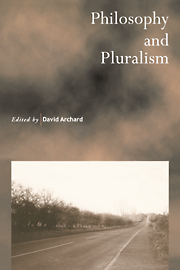Book contents
- Frontmatter
- Contents
- Notes on Contributors
- Introduction
- Philosophy in Different Cultural Contexts
- A Case for Philosophical Pluralism: The Problem of Intentionality
- William James, ‘A Certain Blindness’ and an Uncertain Pluralism
- Cultural Realism: the ancient philosophical background
- Religion and Pluralism
- A Single True Morality? The Challenge of Relativism
- Pluralism, Realism and Truth
- Value-Pluralism
- Moral Philosophy and its Anti-pluralist Bias
- Coping with the Many-Coloured Dome: Pluralism and Practical Reason
- Rawlsians, Pluralists, and Cosmopolitans
- Political Liberalism, Secular Republicanism: two answers to the challenges of pluralism
- ‘Race’ in Britain and the Politics of Difference
- Tragedy, Moral Conflict, and Liberalism
- References
Value-Pluralism
Published online by Cambridge University Press: 30 October 2009
- Frontmatter
- Contents
- Notes on Contributors
- Introduction
- Philosophy in Different Cultural Contexts
- A Case for Philosophical Pluralism: The Problem of Intentionality
- William James, ‘A Certain Blindness’ and an Uncertain Pluralism
- Cultural Realism: the ancient philosophical background
- Religion and Pluralism
- A Single True Morality? The Challenge of Relativism
- Pluralism, Realism and Truth
- Value-Pluralism
- Moral Philosophy and its Anti-pluralist Bias
- Coping with the Many-Coloured Dome: Pluralism and Practical Reason
- Rawlsians, Pluralists, and Cosmopolitans
- Political Liberalism, Secular Republicanism: two answers to the challenges of pluralism
- ‘Race’ in Britain and the Politics of Difference
- Tragedy, Moral Conflict, and Liberalism
- References
Summary
A view with some considerable influence in current moral and political philosophy holds that there is a plurality of values, all of them fundamental and authoritative and yet, in some genuinely disconcerting way, in conflict, I shall call it ‘Value-pluralism’.
It is a philosophical thesis. It does more than record the fact that choice often involves conflicts, moral and other, and that choosing can be a difficult and sometimes even an appalling thing to do. That experience any serious ethics must acknowledge. It is basic, but it is not a surprise, philosophically or otherwise; whereas the claim of the value-pluralist is meant to be philosophically surprising and significant. Further, value-pluralism is to be distinguished from what Mill, Moore and Rawls call ‘intuitionism’ in ethics: the view that there is no single ethical standard to which all principles of conduct must conform, but a number of ethical principles all equally fundamental. ‘Ethical pluralism’ would be a good term for this view; it is a philosophical thesis, and certainly not uncontroversial—but value-pluralism is meant to go beyond it. The question is how. There are two main suggestions. One is that, at least in some cases in which fundamental values conflict, there is no rationally determinable answer to the question which should take precedence. The conflict is inarbitrable. Another is that in some such cases one does wrong whatever one does, Wrong doing is inescapable. Both suggestions take value-pluralism beyond simple ethical pluralism—this paper considers both of them.
- Type
- Chapter
- Information
- Philosophy and Pluralism , pp. 101 - 116Publisher: Cambridge University PressPrint publication year: 1996
- 4
- Cited by

